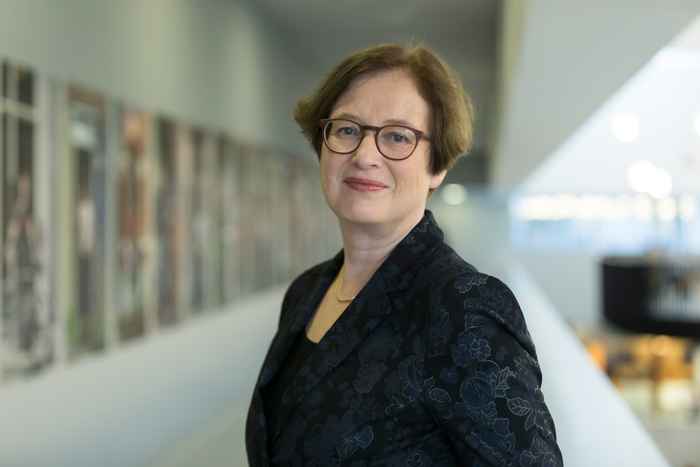A look behind the scenes of online education
Part 3: In conversation with Joti Roest, chairman of the Examination Board
8 December 2020

Joti tells us about the switch to digital education and exams: 'The most important starting point for the Faculty and the Examination Board from the first day was that students have as little study delay as possible and can take exams as soon as possible'.
It was directly a great challenge to make remote examination possible, as the lockdown was announced just before an examination period. As a result, exams could no longer be held in an examination room. Joti: 'Because students now had to do examinations 'at home', the identity of the person taking the examination could not be established and there was no surveillance. Although we naturally assume that the vast majority of students do not betray that trust, our monitoring role nevertheless requires us to take measures to prevent and curb fraud'.
We know that the impact of proctoring on students is high, both from a privacy perspective and because of the stress it causes.
Testing framework for remote examinations
What goes on behind the scenes when organising digital education and examinations for the Examination Board? Joti: 'Over the past few months we have designed a testing framework for remote examinations and, in consultation with the testing expert, the education directors and the ESC, we are trying to refine this framework more and more and to tailor it to the various examinations: in other words, truly customised. I think that the framework that has now been developed can continue to be useful even after the corona crisis if international students have to take examinations remotely. So our new expertise is useful for the future!'
'Less positive is the fact that we have also developed an adapted penalty system for the sometimes serious fraud cases we encounter. Fraud doesn't make you happy: lawyers need to have their ethical compass in order to fulfil their role in society later on'.
To prevent fraud, anti-fraud measures, such as proctoring, have been put into place. Joti tells us that the use of these measures is being carefully considered: 'The Amsterdam Law School attaches great importance to careful decision-making on this matter. We know that the impact of proctoring on students is great, both from a privacy perspective and because of the stress it causes. We do not think lightly about the use of this: it is only justified if there are insufficient alternative, fraud-reducing measures or forms of examination possible'.
We must ensure that the degrees students are now working hard for is worth as much as degrees issued outside the corona crisis.
Protecting the quality of degrees
Joti explains what she is confronted with in the current situation: 'We try to keep a balance between the need to reduce fraud on the one hand and the interest of students to take exams in the most 'normal way possible' on the other hand. We realise that measures such as proctoring and a ban on backtracking are stressful, but we have to ensure that the degrees students are now working hard for is worth as much as degrees issued outside the corona crisis. Finding that balance is difficult and requires constant adjustment: sometimes I lie awake about this topic. I sincerely hope that we will see that there will be less fraud through proctoring and Zoomsurveillance, because that offers room to reconsider the 'cocktail' of fraud-reducing measures that is used in every examination'.
What was it like for Joti when things went wrong at the exams? 'I think that's terrible, first and foremost for the students, but also for the teachers who are very involved with them. And for the ESC, which works at full speed to ensure that the examinations went well and could not prevent these 'external' failures'.
Finally, we ask what Joti wants to say to students: 'I know that our anti-fraud measures give you stress. I understand the concerns about that and I therefore find it difficult that we have to use them nevertheless. I hope you understand that we are trying to protect the quality of your degree and make sure that you can graduate without delay. Personally, I hope we can get back to the REC soon, I miss our 'three-dimensional' students enormously!'
Information about the board of examiners
The most important task of the Examination Board is to guarantee the quality of examinations. Put simply, the committee ensures that the Bachelor's and Master's diplomas that students receive meet the requirements of the Teaching and Examination Regulations. Further rules are laid down in the Examination Regulations; therefore the Examination Board assesses requests for exemptions, extra opportunities or extension of the thesis track.
The Examination Board of the FdR has 9 members, lecturers from the various departments of the Amsterdam Law School and an external member who is a testing expert. The Examination Board meets every month and has two subcommittees: a Testing Board that evaluates the testing quality of the subjects and the various study programmes and a Fraud Board that comes into view if there is a suspicion of fraud or plagiarism. The Bureau Examination Board supports the Examination Board and handles all requests that are submitted (digitally).
Also interesting to read
Read other articles in which we take a look behind the scenes of digital education:

It seems to me that we rely more on each other to make online education successful.Read part 1. With teacher Selma de Groot

We do everything we can to ensure good interaction between lecturer and students.Read part 2. With Liza, coördinator ICTO